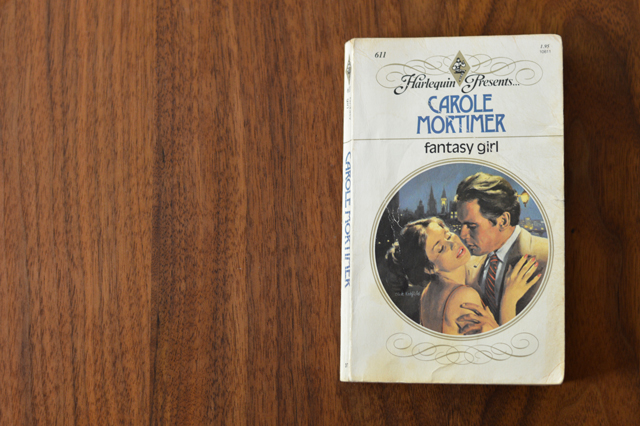 Welcome back to the Utterly Unscientific Summer Saturday Series Sex Survey! I gotta be honest, I wasn’t sure I was going to be able to continue this project a few weeks ago. I was trapped in the sexist, racist, slut-shaming, heroine-blaming, alpha-hell of 1970s contemporary category romance and, uh, I’d rather lost my objectivity and academic-minded distance. Not that every book is that bad, just that I’d really started to get beaten down by the outmoded attitudes on EVERYTHING.
Welcome back to the Utterly Unscientific Summer Saturday Series Sex Survey! I gotta be honest, I wasn’t sure I was going to be able to continue this project a few weeks ago. I was trapped in the sexist, racist, slut-shaming, heroine-blaming, alpha-hell of 1970s contemporary category romance and, uh, I’d rather lost my objectivity and academic-minded distance. Not that every book is that bad, just that I’d really started to get beaten down by the outmoded attitudes on EVERYTHING.
Carole Mortimer has saved this survey.
I’m not going to try and kid you. The first third of this book was a slog. I didn’t understand the character dynamics at all. I couldn’t figure out where the plot was going. A major part of the story involves marital infidelity, which isn’t a trigger for me or anything, just a fairly uncomfortable topic that I’ve never spent much time dwelling on. Since it has such a prominent role and neither the hero nor the heroine are involved except as siblings to the affected parties, it comes off as a bit of distraction from the main romance plot. Also, this is your trigger warning if marital infidelity is one for you.
OH BUT THEN.
Fantasy Girl by Carole Mortimer may not be the most romantic book I’ve written about during this sex survey, but from the perspective of my stated objective, figuring out the whens, whys and hows of increasing sexual contact in category romances novels, it’s by far the most interesting.
Natalie Faulkner is a former model who now, at twenty-five, owns her own modeling agency. Modeling was not enough of a challenge for her and she loves her career. But her current boyfriend, the unfortunately named Lester, prefers a woman willing to give up her business to be a wife and mother. Luckily Natalie is not exceedingly attracted to Lester, nor is she in love with him so when hero Adam Thornton enters the picture, she is more than ready to consider a change.
Adam is the owner of a large cosmetics company that employs some of Natalie’s models, including her sister Judith. Here’s where things start to get dicey. Adam’s sister Tracey is married to a man named Jason, who is having an extramarital affair with Judith. The first time we meet Adam is when he confronts Natalie about this, accusing her of running a procurement service rather than a modeling agency. The rest of the book continually brings Natalie into conflict with Adam over Judith, Tracy and Jason’s drama, giving a back seat to any coherent romantic arc. So there’s not much internal conflict here despite the angst.
But this is where doing an historical survey of these category romances gets intriguing. Because despite the lack of fabulosity of the relationship journey, I’m vibrating with excitement over this book. The way Mortimer sets up the extramarital relationship between Judith and Jason as a contrast to the (we are encouraged to think) perfectly acceptable and non-controversial premarital sexual relationship between Adam and Natalie tells us a lot about early 1980s sexual mores. I’m not willing to expand this into sociological implications quite so let’s just assume we’re talking here about the mores of the average Harlequin/Mills & Boon reader/writer/editor/publisher.
Throughout most of the 1970s and even into the 1980s, at least the random sampling of books I’ve read have contained a wide range of what I’d call sub-optimal sexual scenarios. We’ve had a range of non-consensual sex, lack of premarital sex, punishing kisses, obliviousness about sexual desire, and a general dissatisfaction with just letting a heroine experience a perfectly reasonable adult human female response to seeing, kissing, etc. a hot guy. But not in Fantasy Girl. There are a couple of rough kisses early on that the hero fails to obtain permission for, but there is never any instance of the heroine resisting. Rather, she is fully on board for everything physical that happens.
There’s a scene on page 89 that puzzled me exceedingly when I came across it. Adam and Natalie are alone in her apartment. He has just come to blackmail her with future contracts between his cosmetics company and her modeling agency, when suddenly they’re kissing and then naked. It’s seriously abrupt. They’ve been sniffing around each other before this point of course, even kissing a couple of times. But nothing in their romantic arc prepared me for sudden nakedness. And once everyone has all their clothes off and they’re getting to what I assumed would be full docking procedures, Adam STOPS. Natalie doesn’t tell him to stop. She’s actually pissed at him for not carrying on. She’s completely turned on, accepting and ready to go. She actually beats on him because she’s angry that he stopped. And frankly, it’s the sexiest scene in the book, lending it weight that future encounters don’t carry. Even later when they finally do have sex, it’s not this hot.
But here’s the most revolutionary thing: the text carries absolutely no judgement. There are no snide comments about wantonness, nothing about needing to be married or even in love first. This is unprecedented for my experience of Harlequin Presents to this point. It’s the clearest indication I’ve had of the imprint changing into what we have now come to expect from our romance.
And lest you think I’m reading too much into this, there’s an entirely different scenario set up with the infidelity plot line to provide an obvious foil to Natalie and Adam’s relationship. Judith, Natalie’s sister, is not a very likeable character–she’s spoiled, selfish and lackadaisical about work, and has been since childhood as the overindulged younger sibling. Her paramour, Jason, is in the same boat with his lying, cheating and serial womanizing. As the story proceeds, both Judith and Jason try to draw parallels between their extramarital relationship and Natalie and Adam’s premarital one, trying to shame Natalie into thinking she’s somehow just like them. Here’s an exchange between Adam and Natalie from page 103:
‘My relationship with Adam is none of your damned business!’ she snapped.
‘Maybe not,’ he taunted. ‘But I’m sure Judith will be interested to hear that her supposedly prudish sister has no need to preach after all.’
Natalie stiffened, her eyes narrowed. ‘What do you mean?’
He gave a mocking laugh, his good-looking face ugly in his contempt. ‘Judith told me about the sisterly chats the two of you have been having lately, about your preaching attitude. She was even starting to feel guilty about seeing me, but not when I told her about you and Adam.’
Later, Judith and Natalie have a similar exchange that echoes this one. The thing is, their situations are not the same and the reader knows it. Or, if they don’t know it, then the lack of empathy Judith and Jason have for Jason’s wife Tracey make it perfectly clear that these two are both conniving and selfish, with moral compasses not to be trusted. (One aside: if the judgment leveled at infidelity makes anyone uncomfortable, Judith and Jason end up together at the end and Tracey is happier without Jason–so even the foil gets a “happy” ending. We’re left to understand that everyone hopes the best for them, though privately doubts their future happiness, a perfectly rational assessment in my view based on their characters.)
The end result of all this is that the reader is left with the feeling that the consensual, premarital sex that the heroine desperately desires is nothing to be ashamed of, which is definitely not the impression that most of my category romance reading in this survey has left me with to this point. Rather than needing to be argued, bullied, kissed and cajoled into sexual submission (in order to free herself in love), Natalie is given permission by both writer and reader to enjoy herself fully without any of the rigamarole that has seemed heretofore necessary to get a hero and heroine into bed. Even though most of the sex is not terribly graphic, at least not by current romance standards, Natalie and Adam have a lot of it. Then toward the end of the book, they get married and have a lot more. This isn’t the awakening of the sexual revolution, this is a bright, bold, neon statement that it’s here and if we’re honest, it’s been that way for a good long while.
Fantasy Girl draws a sharp line between premarital sex where everyone is consenting and no one is hurt by it and extramarital sex where there is an injured party. In a time where I can imagine both versions being viewed with equal disdain (and has been, if obliquely in HPs to this point), Mortimer paints a very different picture. That it happens to go hand-in-hand with both a (finally) happily married Adam and Natalie and a successful female business owner is just icing on the cake.
Really, it’s like, “Hello Harlequin reader! Welcome to sexual liberation. Have a paradigm shift.”
Thank goodness.

